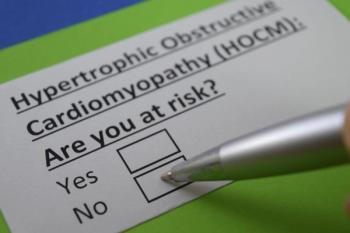
FDA OKs Dapagliflozin for Heart Failure With Reduced Ejection Fraction
Officials with the FDA have approved dapagliflozin (Farxiga, AstraZeneca) to reduce the risk of cardiovascular death and hospitalization in adults with heart failure with reduced ejection fraction, with and without type 2 diabetes.
Officials with the FDA have approved dapagliflozin (Farxiga, AstraZeneca) to reduce the risk of cardiovascular (CV) death and hospitalization in adults with heart failure with reduced ejection fraction (HFrEF), with and without type 2 diabetes, according to a press release.1
AstraZeneca had previously received
Dapagliflozin is also approved as an adjunct to diet and exercise to improve glycemic control in adults with type 2 diabetes. In October 2019,
This approval is based on data from the landmark phase 3 DAPA-HF clinical trial. The study included 4744 patients with New York Heart Association class II, III, or IV HF and an ejection fraction of 40% or less. Patients received either dapagliflozin (at a dose of 10 mg once daily) or placebo, in addition to recommended therapy.1
Over the median of 18.2 months, the primary outcome, which was a composite of worsening HF or CV death, occurred in 16.3% of patients treated with dapagliflozin and 21.2% of patients treated with placebo (hazard ratio [HR], 0.74; 95% confidence interval [CI], 0.65 to 0.85; P<0.001).2
According to the findings, a first worsening HF event occurred in 10% of patients in the dapagliflozin group and in 13.7% in the placebo group (HR, 0.70; 95% CI, 0.59 to 0.83). CV death occurred in 9.6% in the dapagliflozin group and 11.5% in the placebo group (HR, 0.82; 95% CI, 0.69 to 0.98); 11.6% and 13.9%, respectively, died from any cause (HR, 0.83; 95% CI, 0.71 to 0.97).2
Additionally, these findings in patients with diabetes were similar to those in patients without diabetes. The safety profile of dapagliflozin was consistent and the frequency of adverse effects related to volume depletion, renal dysfunction, and hypoglycemia did not differ between treatment groups, according to the study.2
“The groundbreaking results of the DAPA-HF trial have transformed heart failure therapeutics,” lead study investigator John McMurray, MD, Cardiovascular Research Centre, Institute of Cardiovascular and Medical Sciences, University of Glasgow, UK, said in a statement.1 “Today’s approval provides physicians with a completely novel pharmacological approach that greatly improves outcomes for patients with heart failure with reduced ejection fraction.”
References:
1. Farxiga approved in the US for the treatment of heart failure in patients with heart failure with reduced ejection fraction. News Release. AstraZeneca; May 6, 2020. Accessed May 6, 2020.
2. McMurray JJV, Solomon SD, Inzucchi SE, et al. Dapagliflozin in patients with heart failure and reduced ejection fraction. N Engl J Med. November 21, 2019. DOI: 10.1056/NEJMoa1911303
Newsletter
Pharmacy practice is always changing. Stay ahead of the curve with the Drug Topics newsletter and get the latest drug information, industry trends, and patient care tips.























